


WHITEPAPER
A Three-Pronged Approach to Driving Purchasing Compliance Across Your Pharmacy
Download White PaperIn navigating the intricacies of pharmaceutical procurement and bolstering purchasing compliance, it’s important that pharmacies adopt three essential strategies that streamline operations, enhance efficiency and fortify adherence to contractual obligations and regulatory frameworks. These strategies, when implemented effectively, contribute to maximizing cost savings, optimizing rebate potential and ensuring a seamless and compliance procurement process.
Unify Purchasing for Streamlined Compliance
Integrating all aspects of purchasing into a centralized solution emerges as the cornerstone of streamlined compliance management. By consolidating the entire product catalog into a unified platform, pharmacies gain a comprehensive overview of available purchasing options, enabling informed decision-making without compromising compliance standards. This unified approach also streamlines administrative tasks by enabling the seamless uploading of purchasing orders through a single interface. Integrating this solution with other crucial functions such as receiving, accounts payable and credit tracking further strengthens relationships with vendors, fostering a collaborative approach that bolsters compliance without replacing established vendor relationships.
Automate Purchasing Processes for Consistent Compliance
The automation of purchasing processes serves as a catalyst for enhancing efficiency and maintaining consistent adherence to compliance standards. Automated systems provide real-time insights into accurate costs, factoring in rebates and variations in vendor pricing. By leveraging these automated systems, pharmacies make informed decisions regarding the best items to purchase to meet contractual agreements, thereby optimizing their purchasing strategy. Moreover, the automation of workflows and purchasing rules across all pharmacy teams and locations ensures uniform compliance through the organization, reducing the likelihood of non-compliance and streamlining operations for greater efficiency.
Track and Monitor Compliance with Vendors Internally
Implementing robust tracking and monitoring processes emerges as a critical element in maintaining purchasing compliance. By tracking compliance with primary vendors, group purchasing organizations (GPOs) and buying groups, pharmacies ensure consistent adherence to contractual agreements and maximize rebate potential across all sources. Analyzing purchasing data and rebate performance presents identification of trends and opportunities for improvement, enabling pharmacies to adjust their purchasing strategies to access higher rebate tiers. Additionally, monitoring vendor and internal compliance facilitates the identification and resolution of discrepancies, ensuring seamless procurement processes and safeguarding the integrity of the pharmaceutical supply chain.


Contracts, Agreements and Regulations.
In today’s turbulent pharmaceutical landscape, characterized by an alarming surge in drug shortages, maintaining robust purchasing compliance stands as a pillar for pharmacies. According to the American Society of Health-System Pharmacists (ASHP), the staggering number of active drug shortages, reaching a peak of 301 in the first quarter of 2023, has underscored the urgency of implementing a comprehensive approach to tackle this pressing challenge. With contracts and agreements serving as a shield against the impact of shortages, coupled with adherence to regulations such as the Drug Supply Chain Security Act (DSCSA), pharmacies safeguard their operations and ensure patient safety. This white paper aims to delve deeper into the three pivotal strategies of driving purchasing compliance—vendor contracts, agreements and regulations—and provide insightful strategies and tools for navigating the pharmaceutical procurement process.
Download the white paper
Complete this form to get the PDF version of our white paper.
Understanding the Value of Purchasing Compliance
Understanding Contracts
The contractual agreements established with vendors and suppliers delineate the terms of engagement, pricing structures and product sourcing guidelines. Pharmacies must meticulously navigate the complexities of these contracts, ensuring that the agreed-upon terms align with their strategic objectives and financial sustainability. The ability to unify purchasing under a single robust system (exemplified by implementing SureCost’s pharmaceutical compliance software) facilitates comprehensive oversight of contract management, fostering transparency and accountability.
“Understanding what’s included and excluded in your agreements is vital for optimizing purchasing behavior within your market. Maximizing vendor relationships relies on aligning your needs with the right agreements, ensuring you surpass and maximize their potential impact.”
Calvin Hunsicker, founder and chief of product officer at SureCostThe Significance of Vendor Agreements
Agreements, on the other hand, emphasize the alignment of both external and internal stakeholders. External vendor compliance refers to vendors adhering to the terms of agreements by consistently delivering the correct items in the appropriate quantities and at agreed-upon prices. This ensures that pharmacies rely on their vendors for timely and accurate deliveries, thus maintaining smooth operations and preventing disruptions in the supply chain.
“I’ve been in this industry for a long time, and I’ve consistently observed pricing errors that lean unfavorably toward our side. When you can go back with concrete evidence, discussions with vendors take a productive turn where the number of errors is reduced. This emphasizes the importance of vigilant scrutiny to make sure you’re being adequately and fairly priced and treated.”
Mark Ey, chief operating officer and senior vice president at National Community Pharmacists Association (NCPA)Internal compliance pertains to the purchasing team within the pharmacy making decisions that are in line with the pharmacy’s overarching goals and strategies. This includes adhering to standardized purchasing processes and guidelines set by the pharmacy to ensure streamlined operations and cost-effective procurement.
Navigating Pharmaceutical Regulatory Compliance
Pharmaceutical compliance with regulatory frameworks, such as DSCSA, is imperative for ensuring patient safety and building trust within the community. This evolving landscape of regulations necessitates a proactive approach to adopt systems that streamline compliance monitoring. Pharmacies must embrace advanced solutions that enable the serialization and efficient tracking of products. The ability to generate comprehensive reports empowers pharmacies to stay consistently compliant and mitigate potential risks effectively.
Importance of Purchasing Compliance
Comprehending the significance of purchasing compliance reveals its pivotal role in mitigating the adverse impacts of drug shortages. By upholding these standards, pharmacies proactively manage shortages, including alternative sourcing strategies, negotiation of pricing adjustments and securing priority access to available stock. Additionally, adherence to pricing and reimbursement agreements builds trust with vendors and ensures financial stability. By leveraging compliance-driven data analytics, pharmacies develop robust demand forecasts, enhancing their ability to navigate drug shortages while ensuring uninterrupted patient care.
Furthermore, adherence to these pharmacy compliance standards serves as a safeguard against the risks of receiving counterfeit drugs, legal penalties, tarnished reputations and operational disruptions. Purchasing compliance ensures that pharmacies not only meet their contractual obligations but also safeguard their financial stability, mitigate risks and maintain a consistent supply of vital medications. By upholding purchasing compliance standards, pharmacies maximize cost efficiency, optimize vendor relationships and ultimately uphold the continuity of patient care.
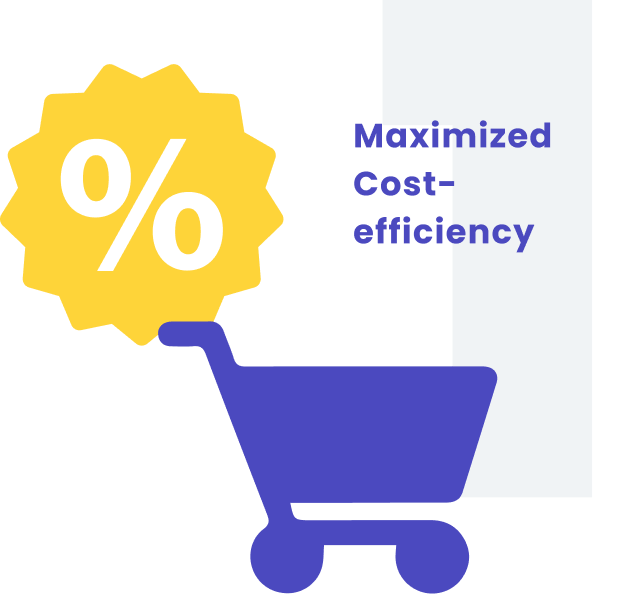
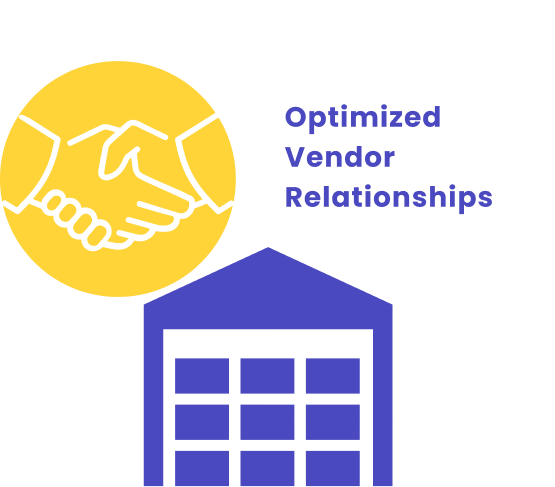
Challenges Pharmacies Face in Driving Purchasing Compliance
Despite the critical role that purchasing compliance plays, pharmacies encounter a multitude of challenges in its implementation. The complexity of ensuring compliance is compounded by the diverse terms and conditions embedded within vendor contracts, necessitating meticulous tracking and management. Managing multiple vendor relationships, tracking compliance across various contractual agreements and standardizing purchasing strategies across different pharmacy locations present formidable challenges. Furthermore, the need to capture, verify and store extensive data, coupled with the requirement for consistent adherence to pharmaceutical regulatory compliance frameworks, demands a robust infrastructure and comprehensive oversight, creating additional complexities for pharmacies striving to maintain purchasing compliance in the face of escalating drug shortages.
Introducing Purchase Manager Compliance Insights™
To address these challenges, SureCost introduces Purchase Manager Compliance Insights™, a powerful compliance software solution designed to provide real-time pharmaceutical compliance performance metrics and ensure purchasing strategies align with vendor agreements while identifying additional cost-saving opportunities.
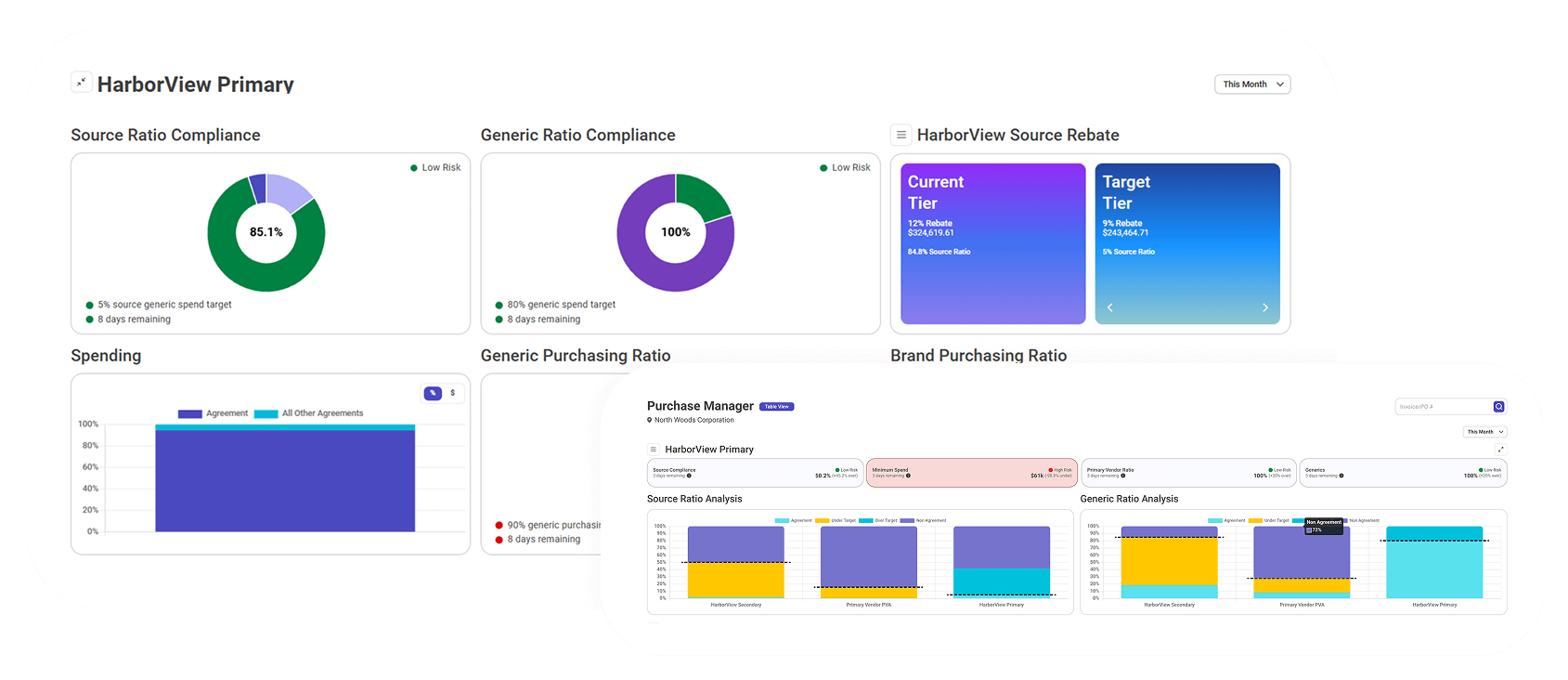
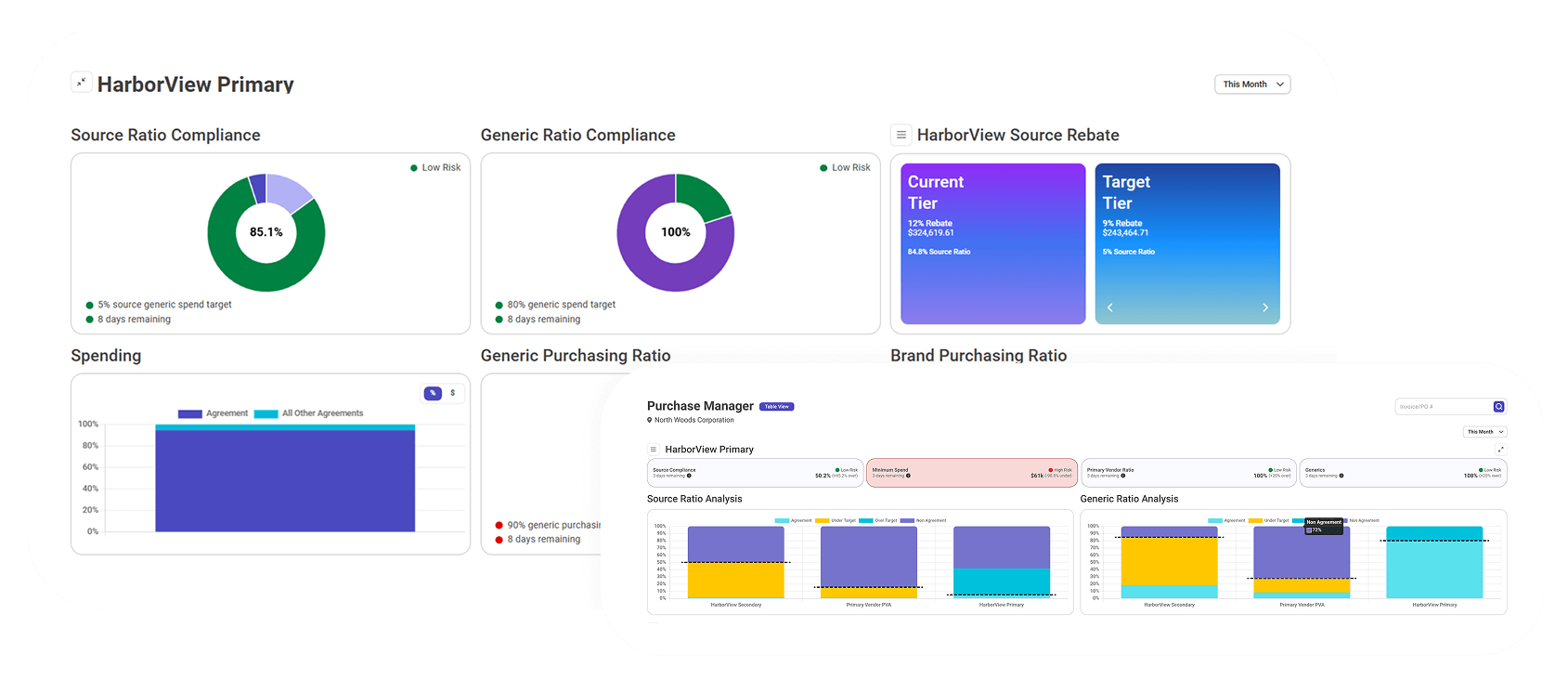
Key Features and Benefits
Real-time pharmacy compliance reporting
Receive up-to-the-minute insights (rather than waiting until the end of the quarter), allowing for proactive purchasing strategy adjustments.
Accurate agreement capture
Ensures vendor agreements are correctly documented and applied, minimizing rebate calculation errors.
Optimized rebate performance
Helps pharmacies meet rebate tiers to maximize savings.
Comprehensive pricing visibility
Gain insight into pricing across primary vendors, GPOs, buying groups, secondary vendors and manufacturers to ensure cost-effective purchasing.
Vendor source spend analysis
Allows pharmacies to assess and adjust purchasing habits to optimize rebate eligibility.
Automated processes
Streamlines compliance monitoring and purchasing decisions, reducing manual efforts.
Expanded vendor options
Avoid drug shortages and back orders by identifying cost-saving alternatives outside primary vendor agreements.
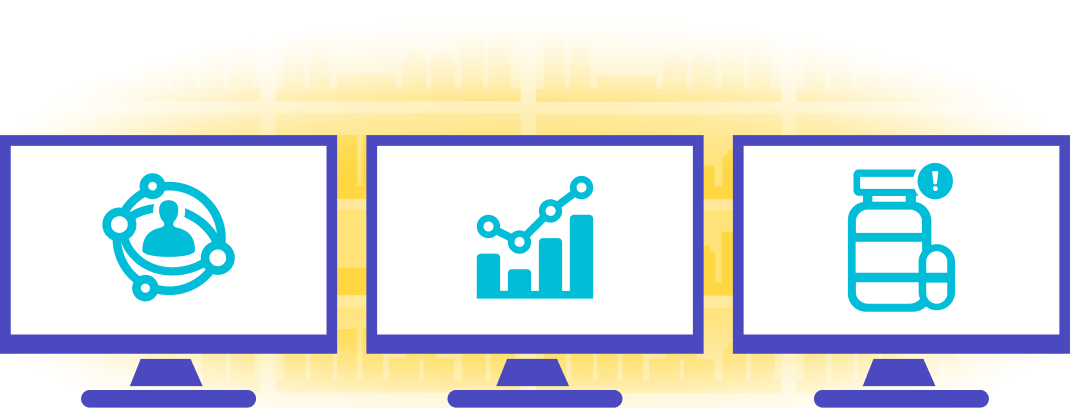
By leveraging Purchase Manager Compliance Insights™ software, pharmacies can ensure they are receiving the correct rebates, quickly adjusting purchasing strategies and remaining competitive while optimizing costs.
The complex landscape of pharmaceutical procurement necessitates a robust and unwavering commitment to purchasing compliance. By effectively navigating the intricacies of contracts, agreements and regulatory compliance frameworks, pharmacies mitigate the adverse impacts of drug shortages, optimize cost efficiency and uphold patient safety. These smarter purchasing strategies serve as pillars in the pursuit of enhanced purchasing compliance, empowering pharmacies to navigate the challenges posed by fluctuating market dynamics and emerging regulatory requirements while ensuring consistent and uninterrupted patient care.
With a comprehensive understanding of the significance of purchasing compliance and the implementation of smarter purchasing strategies, pharmacies ensure seamless and uninterrupted access to vital medications, underscoring their commitment to delivering high-quality patient care and maintaining the integrity of the pharmaceutical supply chain.
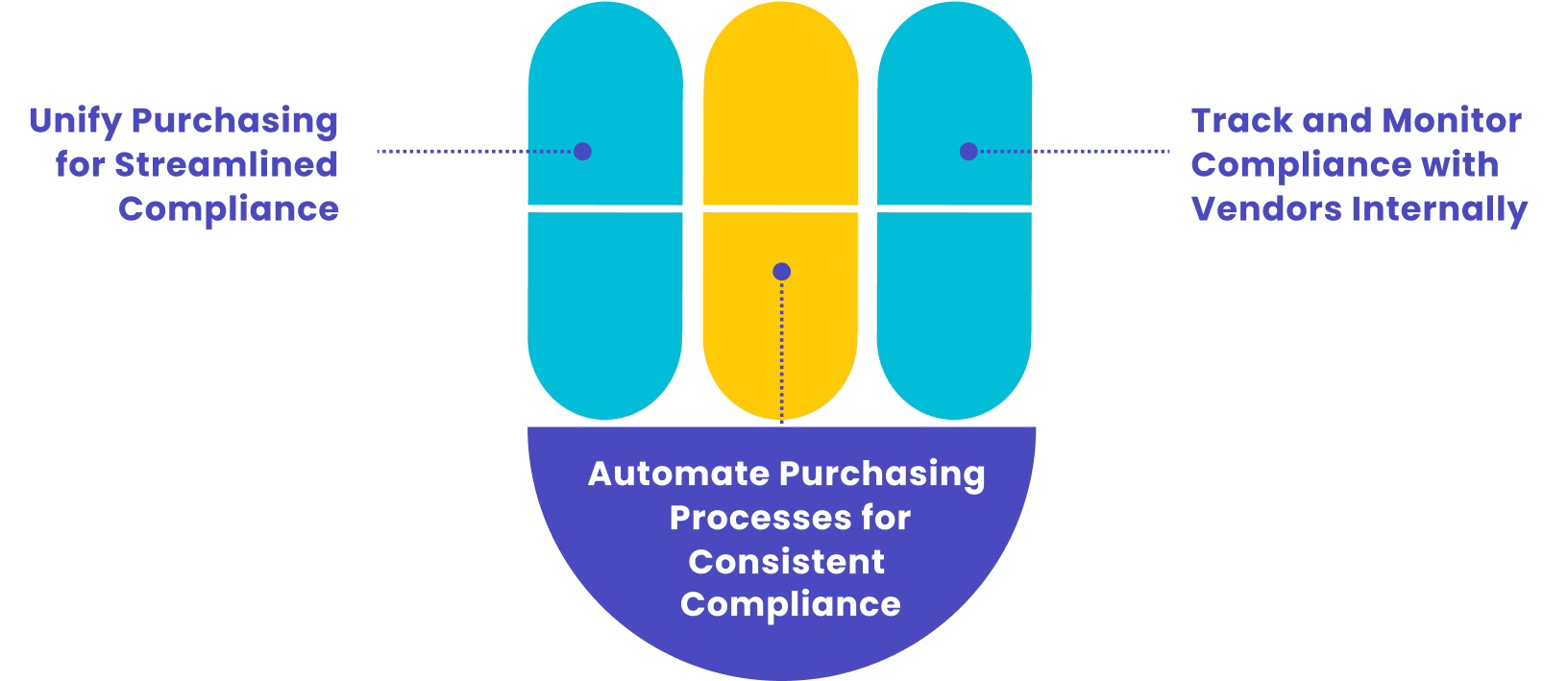

References
- Severity and Impact of Current Drug Shortages, report (American Society of Health-System Pharmacists June/July 2023),
https://www.ashp.org/-/media/assets/drug-shortages/docs/ASHP-2023-Drug-Shortages-Survey-Report.pdf.

